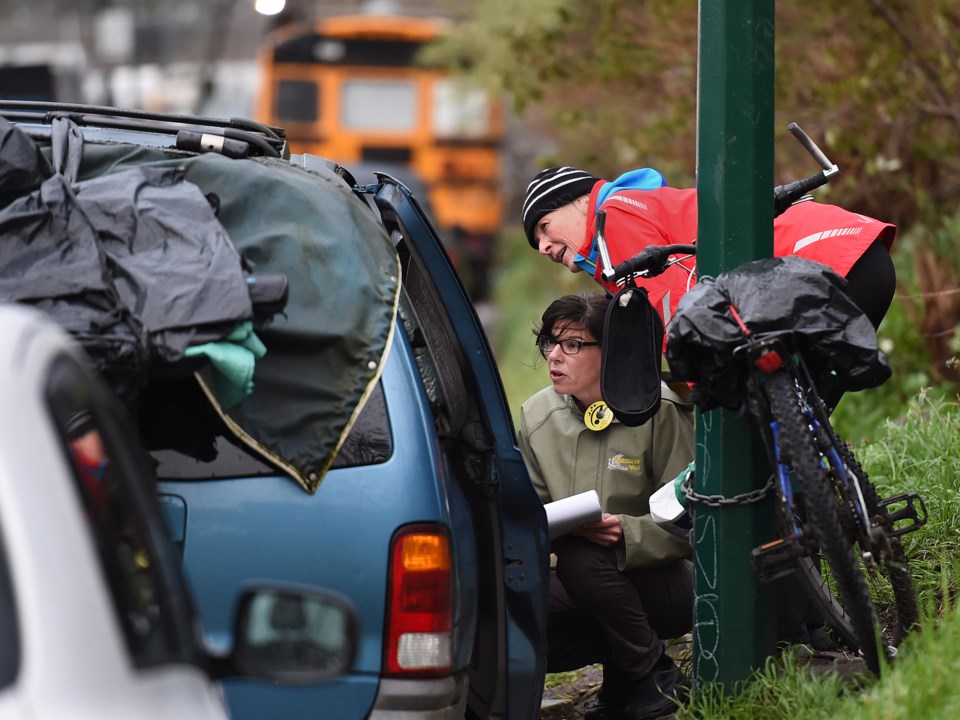Another year, another homeless count.
This week, hundreds of volunteers in Â鶹´«Ã½Ó³»and across the region will be counting homeless people over a 24-hour period.
They’ll also speak to the homeless interested in answering a survey about how long they’ve been on the street, where they last lived in a home and the state of their health.
People living in shelters, recreation vehicles and cars will also be counted.
A few months ago, I asked Mayor Kennedy Stewart and Housing Minister Selina Robinson to predict whether this year’s count in the city would find less, more or the same number of people without a home.
Neither politician
That’s probably because the trend is against them, with homelessness in Â鶹´«Ã½Ó³»reaching an , with 2,223 people counted over two days last March.
That statistic always comes with an asterisk. City officials believe the number of people counted each year is an undercount, with up to 20 per cent of homeless not reflected in the total.
City reports show the number of homeless people counted in Â鶹´«Ã½Ó³»in 2005 was 1,364, then climbed to 1,847 in 2016. The 2,000-mark was first reached in 2017 and has incrementally increased since then.
Some argue the numbers have shot up because the general population in the city has grown. The facts are the general population has not increased at the pace that homelessness has in Vancouver.
Some argue most of the homeless people in Â鶹´«Ã½Ó³»have come from other parts of the country and are attracted to the city’s climate, its resources for poor people and getting a chance at subsidized housing.
The facts are last March’s report on the count showed that a total of 81 per cent of 1,183 homeless people who agreed to a survey said they were living in Â鶹´«Ã½Ó³»when they lost their home.
Of the 19 per cent who weren’t living in Vancouver, 41 were from elsewhere in Metro Vancouver, 72 in other parts of B.C. and 70 outside of B.C.
Anyway, the main argument people fighting on behalf of the homeless generally make is that all three levels of government aren’t doing enough to address the problem.
The facts are the provincial and city governments have for several years built supportive housing buildings, renovated single-room occupancy hotels, turned former hotels into temporary housing, opened year-round shelters and increased rent supplements.
In fact, the provincial government currently funds 925 permanent shelter spaces, 329 temporary shelter spaces and 145 "extreme weather" shelter spaces in Vancouver.
Over the last few years, a total of 11 sites opened in Vancouver. That includes the at Main and Terminal, which opened in February 2017.
Another 58-unit complex is under development on Copley Street and should open this month. That will mean more than 700 homes have come on stream in less than three years.
Still, homelessness persists.
Provincial and city politicians have pointed to the federal government, saying it needs to get back in the housing game to make real progress in the fight against homelessness.
Some may recall that then-federal housing minister Jean-Yves Duclos was in November 2017 to unveil a $40-billion, 10-year national housing strategy that aims to reduce chronic homelessness by 50 per cent in Canada.
It remained unclear to me at deadline how that translates to Vancouver.
But add it all up — the new buildings, the modular housing, the feds’ commitment, etcetera— and Â鶹´«Ã½Ó³»and the region should be, or should have been, on its way to moving people off the street.
The drivers, however, of homelessness are still very much in play: substance abuse and mental health issues, young people aging out of foster care, traumatic life events and chronic poverty mixed with a low vacancy rate, high rents and the loss of single-room occupancy hotels such as the closure of the hotels.
For the first time since Stewart became mayor, he will participate in this year’s homeless count. I wanted to tag along with him, but his office declined my request.
I hope to speak to Stewart after the count to see if his experience on the streets has him any closer to making a prediction about whether homelessness will increase this year.
No matter what he says, we’ll have to wait until preliminary results of the count are released later this year to understand the statistical state of the city’s homelessness in 2020.
Until then, the guy sleeping under a tarp in the alley outside the Courier’s office in Mount Pleasant could use a place to stay.
@Howellings



